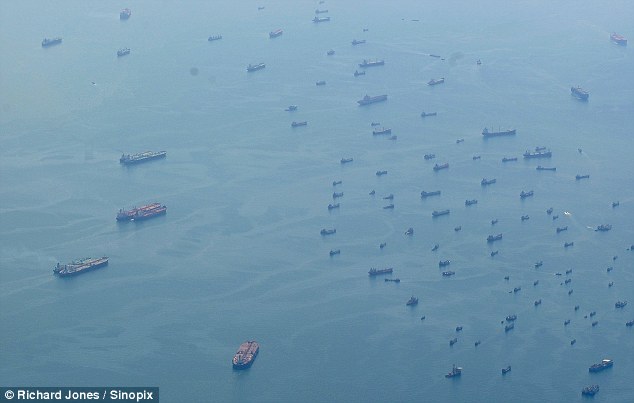
Here, on a sleepy stretch of shoreline at the far end of Asia, is surely the biggest and most secretive gathering of ships in maritime history. Their numbers are equivalent to the entire British and American navies combined; their tonnage is far greater. Container ships, bulk carriers, oil tankers - all should be steaming fully laden between China, Britain, Europe and the US, stocking camera shops, PC Worlds and Argos depots ahead of the retail pandemonium of 2009. But their water has been stolen.
They are a powerful and tangible representation of the hurricanes that have been wrought by the global economic crisis; an iron curtain drawn along the coastline of the southern edge of Malaysia's rural Johor state, 50 miles east of Singapore harbour.
A couple of years ago these ships would be steaming back and forth. Now 12 per cent are doing nothing
You may wish to know this because, if ever you had an irrational desire to charter one, now would be the time. This time last year, an Aframax tanker capable of carrying 80,000 tons of cargo would cost £31,000 a day ($50,000). Now it is about £3,400 ($5,500).
This is why the chilliest financial winds anywhere in the City of London are to be found blowing through its 400-plus shipping brokers.
Between them, they manage about half of the world's chartering business. The bonuses are long gone. The last to feel the tail of the economic whiplash, they - and their insurers and lawyers - await a wave of redundancies and business failures in the next six months. Commerce is contracting, fleets rust away - yet new ship-builds ordered years ago are still coming on stream.
Orders for most existing ships to be delivered within the next six to nine months would be honoured, he predicted, and the ships would go into service at the expense of older vessels in the fleet, which would be scrapped or end up anchored off places like southern Malaysia.
But, says Wallis, 'some ship owners won't be able to pay their final instalments when the vessels are completed. Normally, they pay ten per cent down when they order the ship and there are three or four stages of payment. But 50 to 60 per cent is paid on delivery.'
South Korean shipyard Hanjin Heavy Industries last week said it had been forced to put up for sale three container ships ordered at a cost of £60 million ($100 million) by the Iranian state shipping line after the Iranians said they could not pay the bill.
'The prospects for shipyards are bleak, particularly for the South Koreans, where they have a high proportion of foreign orders. Whole communities in places like Mokpo and Ulsan are involved in shipbuilding and there is a lot of sub-contracting to local companies,' Wallis says.
'So far the shipyards are continuing to work, but the problems will start to emerge next year and certainly in 2011, because that is when the current orders will have been delivered. There have hardly been any new orders in the past year. In 2011, the shipyards will simply run out of ships to build.'
http://www.dailymail.co.uk/home/mosl...recession.html
Comment